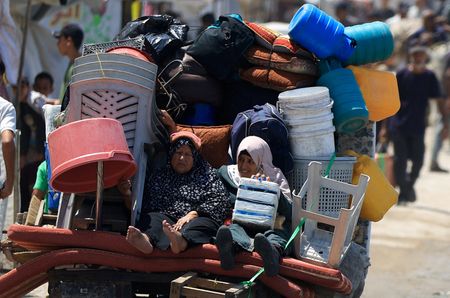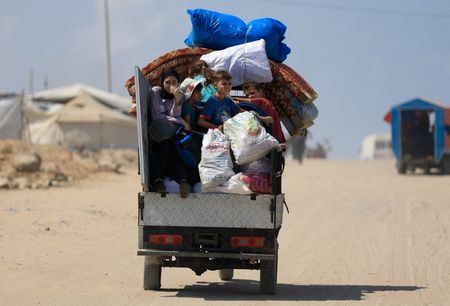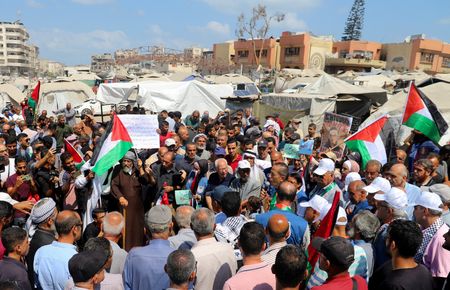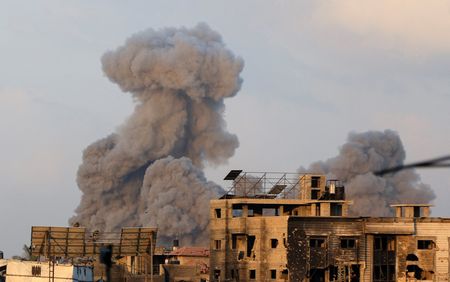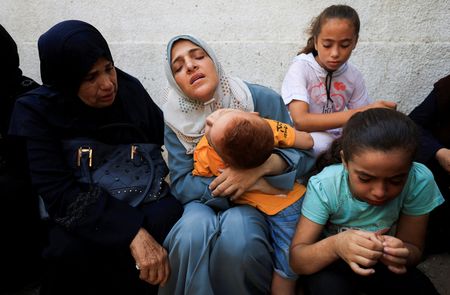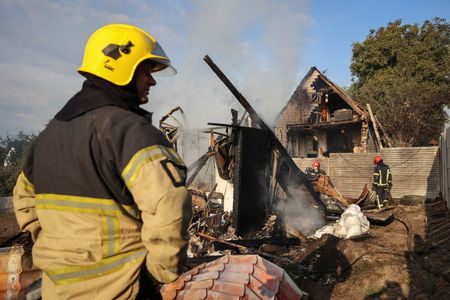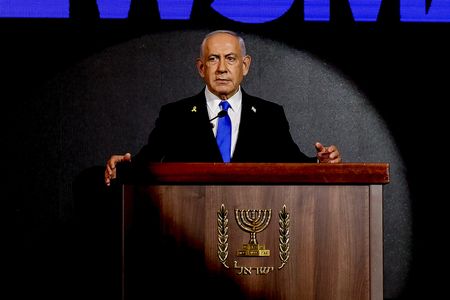By Nidal al-Mughrabi and Maayan Lubell
CAIRO/JERUSALEM (Reuters) -Prime Minister Benjamin Netanyahu said on Thursday that Israel would immediately resume negotiations for the release of all hostages held in Gaza and an end to the nearly two-year-old war but on terms acceptable to Israel.
It was Netanyahu’s first response to a temporary ceasefire proposal put forward by Egypt and Qatar that Hamas accepted on Monday. Israel will dispatch negotiators to talks once a location is set, an Israeli official said.
Speaking to soldiers near Israel’s border with Gaza, Netanyahu said he was still set on approving plans for defeating Hamas and capturing Gaza City, the densely populated centre at the heart of the Palestinian enclave.
Thousands of Palestinians have left their homes as Israeli tanks have edged closer to Gaza City over the last 10 days.
“At the same time I have issued instructions to begin immediate negotiations for the release of all our hostages and an end to the war on terms acceptable to Israel,” he said, adding: “We are in the decision-making phase.”
Israel’s plan to seize Gaza City was approved this month by the security cabinet, which Netanyahu chairs, even though many of Israel’s closest allies have urged the government to reconsider.
His latest remarks underscore the Israeli government view that any deal ensures the release of all 50 hostages captured in Israel in October 2023 and still held by militants in Gaza. Israeli officials believe around 20 are still alive.
The proposal on the table calls for a 60-day ceasefire and the release of 10 living hostages held in Gaza by Hamas militants and of 18 bodies. In turn, Israel would release about 200 long-serving Palestinian prisoners held by Israel.
Once the temporary ceasefire begins, the proposal is for Hamas and Israel to begin negotiations on a permanent ceasefire that would include the return of the remaining hostages.
PALESTINIAN PROTESTSIn a sign of growing despair at conditions in Gaza, residents staged a rare show of protest against the war on Thursday.
Carrying banners reading “Save Gaza, enough” and “Gaza is dying by the killing, hunger and oppression,” hundreds of people rallied in Gaza City in a march organised by several civil unions.
“This is for a clear message: words are finished, and the time has come for action to stop the military operations, to stop the genocide against our people and to stop the massacres taking place daily,” said Palestinian journalist Tawfik Abu Jarad during the protest.
The Gaza health ministry said at least 70 people had been killed in Israeli fire in the enclave in the past 24 hours, including eight people in a house in Sabra suburb in Gaza City.
A statement from the Palestinian Fatah movement said one of those killed in Sabra was a Fatah leader and former militant, along with seven members of his family. There was no immediate comment from the Israeli military.
CEASEFIRE OR CAPTURE OF GAZA CITY?
Even as the military begins its preparations to launch the assault on Gaza City, Israeli officials have indicated that there is time for a ceasefire to be reached.
On Wednesday, the military called up 60,000 reservists in a sign the government was pressing ahead with the plan, despite international condemnation. Such a call-up is likely to take weeks.
Netanyahu is under pressure from some far-right members of his coalition to reject a temporary ceasefire and instead to continue the war and pursue the annexation of the territory.
Some Palestinian families in Gaza City have left for shelters along the coast, while others have moved to central and southern parts of the enclave, according to residents there.
“We are facing a bitter, bitter situation, to die at home or leave and die somewhere else. As long as this war continues, survival is uncertain,” said Rabah Abu Elias, 67, a father of seven.
“In the news, they speak about a possible truce, on the ground, we only hear explosions and see deaths. To leave Gaza City or not isn’t an easy decision to make,” he told Reuters by phone.
On Thursday, Israeli military spokesperson Avichay Adraee wrote on X that the military had started making what he said were initial warning calls to medical and international organisations operating in Gaza’s north, telling them that Gaza City residents should start to prepare to move out of the city and towards the south.
Adraee shared a recording of what he said was an Israeli officer telling a Gazan health ministry official that hospitals in southern Gaza should also prepare to receive patients from medical facilities in the north, who will be forced to evacuate.
A Gaza health ministry official confirmed the phone call had taken place. The ministry rejected the Israeli request to shift medical resources south, warning it would cripple the already devastated health system and endanger over a million residents. It urged international bodies to intervene and protect lifesaving care.
Two more people have died of starvation and malnutrition in Gaza in the past 24 hours, the ministry said on Thursday. The new deaths raised the number of Palestinians who have died from such causes to 271, including 112 children, since the war began.
Israel disputes malnutrition and starvation figures posted by the Gaza health ministry.
(Reporting by Nidal al-Mughrabi in Cairo and Maayan Lubell and Lili Bayer in Jerusalem. Additional reporting by Ebrahim Hajjaj in Gaza; Writing by Howard Goller; Editing by Sharon Singleton, Ros Russell and Daniel Wallis)

